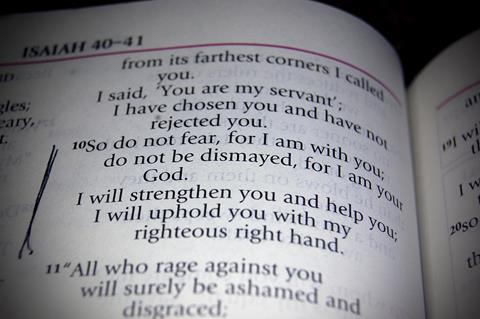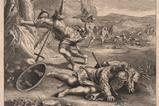The promise of God’s strength in the face of fear is a comforting truth, but Isaiah 41 also warns God’s people against setting up idols in their lives. Are we prepared to take the challenge as well as the comfort contained in the Bible?

For the third year in succession, a verse from Isaiah has topped YouVersion’s list of most popular Bible texts. It reads: “So do not fear, for I am with you; do not be dismayed, for I am your God. I will strengthen you and help you; I will uphold you with my righteous right hand” (41:10).
It is, of course, a lovely verse and popular for obvious reasons: it speaks to our fears, and right now there’s a lot to be frightened about. At a macro level there’s everything from runaway climate change through war in the Middle East and Ukraine to the cost of living crisis.
In our personal lives, very few of us escape heartbreak and loss. So why not take comfort in beautiful words that speak straight to the heart?
Balm to the soul
It would be wrong to deny their power or their relevance. But perhaps one reason these verses are so popular is that they’re perfectly suited to a Western culture that is deeply individualistic, feelings-led and desperate for personal affirmation.
We’ll each have different idols. How willing are we to recognise what they are?
So many of us have bought into the idea that ‘my truth’ trumps any probing question or inconvenient fact; so many of us resist the idea that the Bible is there to disturb the comfortable as well as to comfort the disturbed. Instead, we often go to the Bible for what we want - but what we want isn’t always what we need.
Surprised by the Spirit
Now, this might sound a bit curmudgeonly. It’s very easy to take cheap shots at this kind of popular spirituality. So let me say that I absolutely affirm the power of God to speak through scripture in ways unguessed at by its original writers. “A text without a context is a pretext” we were told in church when I was growing up; fair enough, but it’s surprising how often the Spirit ignores that wise advice.
The famous Baptist preacher CH Spurgeon was converted by a bad sermon on another text from Isaiah: “Look unto me, and be ye saved, all the ends of the earth: for I am God, and there is none else” (45:22). Thank God that he did look, whatever Isaiah’s original intentions were.
Taken in context
It’s not curmudgeonly or faithless to wonder how many of those millions who engaged with YouVersion’s winning verse have read around it a little and understood the real significance of what Isaiah was saying.
In Isaiah 41, the prophet is contrasting the worship of idols with the living and interventionist God of Israel. In v7 it says: “The metalworker encourages the goldsmith, and the one who smooths with the hammer spurs on the one who strikes the anvil. One says of the welding, ‘It is good.’ The other nails down the idol so it will not topple.” In v22 the Lord says: “Tell us, you idols, what is going to happen.”
This bookending of our most popular verse with references to idolatry does two things. First, it makes us read it differently. The stresses fall in different places: not on “you” and “your”, with the emphasis on what God can do for us (so welcome to a culture marked by personal neediness), but on who is performing the actions: “I am with you…I am your God. I will strengthen you and help you; I will uphold you with my righteous right hand” (emphasis added). God is making it clear that he will do this, not idols created by man.
The Bible is there to disturb the comfortable as well as to comfort the disturbed
Second, it drives us to ask what idols are competing with the one true God for our loyalty and love. These idols promise everything but, as Isaiah demonstrates with wonderfully accomplished sarcasm, deliver absolutely nothing (see Isaiah 44:12–20).
They are our own creations, just like the idol knocked up out of a bit of wood or bashed out in a metal-worker’s shop. Having been created, they become magical; they’re invested with a sort of spiritual power, and these creations of ours exert power over us.
Hard truths
We’ll each have different idols (that’s the advantage of made-to-measure gods) but how willing are we to step back and recognise what they are? Have we bought into a particular ideology, political creed or set of values that owe much to the world and little to the Bible?
If so, we’re worshipping the created, not the creator. They should all be pulled down, like the statue of Edward Colston in Bristol which was thrown into the harbour by anti-racism protestors (a thought-provoking illustration, when you think about it).
This is why the Bible is so exciting, and so dangerous. What seems like a sweet promise of personal blessing turns out to be something that undermines our assumptions and rocks our inherited certainties. It is not sweet at all; it’s alarmingly challenging.
I’m glad it’s a popular verse. But I hope those to whom it speaks read a little more than that one verse, and allow God to disturb them as well as comfort them.





































2 Readers' comments